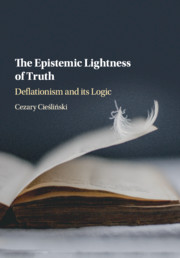Book contents
- Frontmatter
- Contents
- Acknowledgements
- Introduction
- 1 Preliminaries
- 2 Approaches to Truth
- Part I Disquotation
- Part II Conservativity
- 6 (Non)Conservativity of Disquotation
- 7 CT− and CT: Conservativity Properties
- 8 Other Compositional Truth Theories
- 9 Conservativity: Philosophical Motivations
- 10 Maximal Conservative Theories
- 11 The Conservativeness Argument
- Part III Reflection Principles
- Afterword
- Glossary of Symbols
- Bibliography
- Index
10 - Maximal Conservative Theories
from Part II - Conservativity
Published online by Cambridge University Press: 30 November 2017
- Frontmatter
- Contents
- Acknowledgements
- Introduction
- 1 Preliminaries
- 2 Approaches to Truth
- Part I Disquotation
- Part II Conservativity
- 6 (Non)Conservativity of Disquotation
- 7 CT− and CT: Conservativity Properties
- 8 Other Compositional Truth Theories
- 9 Conservativity: Philosophical Motivations
- 10 Maximal Conservative Theories
- 11 The Conservativeness Argument
- Part III Reflection Principles
- Afterword
- Glossary of Symbols
- Bibliography
- Index
Summary
How useful to the deflationist are conservative theories of truth? In this chapter, I will discuss one particular strategy of employing the conservativity condition in order to foster the deflationist's philosophical goals. The main idea is to combine two attractive properties of truth theories: syntactic conservativeness and maximality.
As emphasised in the last paragraph of the previous chapter, conservative truth theories are very attractive to the deflationist in certain important respects. Now, maximality can be viewed as another desirable property. To begin with, imagine the disquotationalist who wants to extend his base theory of syntax with some chosen instantiations of the T-schema. Obviously, the set of instantiations has to be limited in some way in order to avoid the liar-type paradoxes. Unfortunately, this is easier said than done. Which instantiations should be adopted? Which of them should be rejected? What sort of choices can be made without inviting the charge of arbitrariness? Paul Horwich gives the following answer:
The principles governing our selection of excluded instances are, in order of priority: (a) that the minimal theory not engender ‘liar-type’ contradictions; (b) that the set of excluded instances be as small as possible; and – perhaps just as important as (b) – (c) that there be a constructive specification of the excluded instances that is as simple as possible. (Horwich 1999, p. 42)
In view of this, one option which suggests itself consists in trying to include as many instances of the T-schema as possible in an attempt to build a maximal consistent extension of our base theory.
This possibility has been investigated by McGee (1992). At the start, McGee observes that it is indeed possible to extend a chosen base theory (say, Peano arithmetic) in such a way. However, in the end he notices two problems.
Firstly, there are continuum many maximal consistent extensions of Peano arithmetic. In effect, some additional principles will be required to select a truth theory of our choice. In short, maximality is not enough. We still have to “make comparative judgments about which instances of (T) we regard as essential and which we are willing to relinquish”.
- Type
- Chapter
- Information
- The Epistemic Lightness of TruthDeflationism and its Logic, pp. 174 - 182Publisher: Cambridge University PressPrint publication year: 2017



